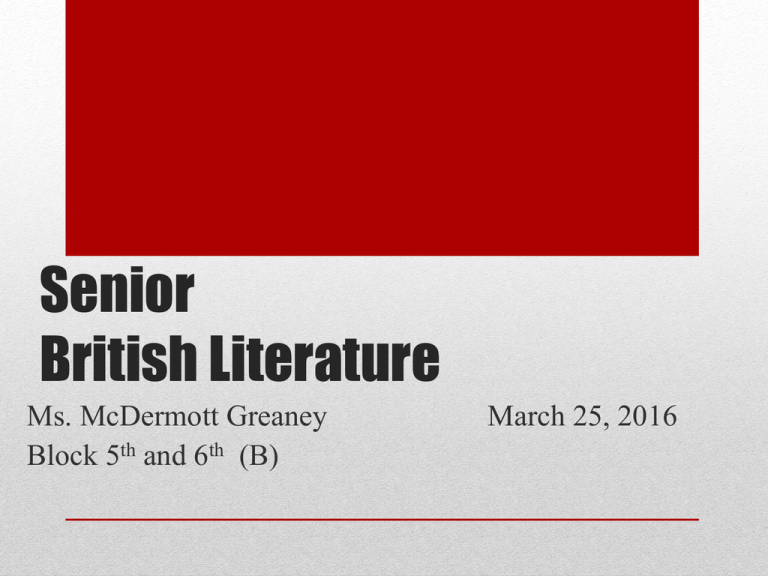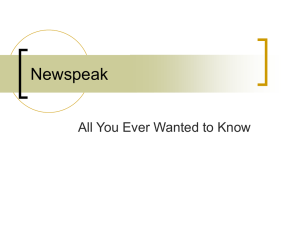Senior British Literature Ms. McDermott Greaney March 25, 2016
advertisement

Senior British Literature Ms. McDermott Greaney Block 5th and 6th (B) March 25, 2016 Respond to the following questions. Include key words and direct evidence from the novel. 1. According to the appendix, what was the purpose of Newspeak? 2. What are the three different levels of vocabulary in Newspeak? 3. What are the two outstanding characteristics of Newspeak grammar? 4. A great many of the B-vocabulary words were “euphemisms”. What are euphemisms? Why would a government want to use them? 5. How does Newspeak deal with the matter of sex? 6. According to the appendix, totalitarian governments like to use abbreviations. Why is this the case? 7. Why would it be nearly impossible to translate a document like the “Declaration of Independence” into Newspeak? Entry Task ..\..\..\1984\Newspeak.ppt There will be a Section I and Newspeak test on Tuesday. Newspeak Romantic (Poetry) Features • Embraced imagination and naturalness. • Preference for personal poetry that focused on experiences and emotions in simple, unadorned language. • Used lyric form to express feeling, self-revelation, and imagination. • Poets adopted a democratic attitude towards their audiences. • Focused on the past or inner dream world to escape the ugly industrial age • Belief in individual liberty; rejection of tyranny • Fascinated by the ways nature and the human mind “mirrored” each other’s creative properties. • Use of the supernatural • Search/quest for “true” beauty Romantics (add to notes) Cornell Notes Essential Question: Who is John Keats and How did he contribute to the Romantic movement of poetry? John Keats (878 4 significant facts on Keats What is an Ode? (879) How does Keats use imagery? (879) What is inverted syntax? (879) “Ode on a Grecian Urn” (884) TPSFASTT Romantic – John Keats Romantic "odes" • Highly lyrical (emotional) poem in which the author speaks to a person or thing absent or present • An author’s deep meditation on the person or object • Connection between subject of ode and nature • A special insight at the end of the poem In a small group create a comic strip that shows the above elements – (example) Comic Strip Title Does the title give a clue about the poem’s content? Paraphrase Put into your own words the literal action of the poem. What is this poem about? Speaker Who is the speaker? Are the speaker and poet the same? Who is the audience. What is the poet’s purpose? Structure Is this free verse (open) or structured (closed)? What is the form? How does it affect the poem’s meaning? Is it important to the poet’s message? Figurative What poetic language is used: simile, metaphor, imagery, alliteration, etc… Language Attitude What is the speaker’s attitude towards the subject of the poem? (Tone) Shifts Make note of a shift (change) in speaker, attitude, rhythm, punctuation, stanza length, rhyme Title Examine the title again, this time trying to figure out its deeper meaning beyond just being a title. Theme What the poem is about (subject) + what the poet is saying about the subject = Theme State the theme as a complete sentence. It is never one word. TPSFASTT Turn in your Entry Task and poems H/W 1984 read w/journal entries (2 quotes and 2 higher level questions) Test on Tuesday on Section I and Newspeak. Unit test on Romantics on Thursday. Homework



